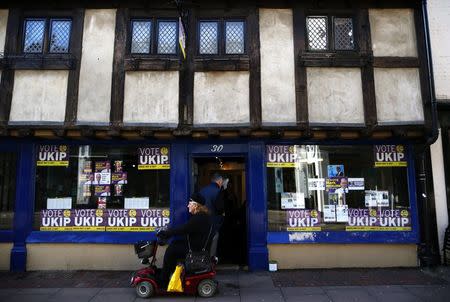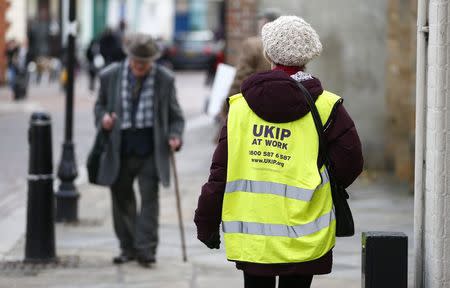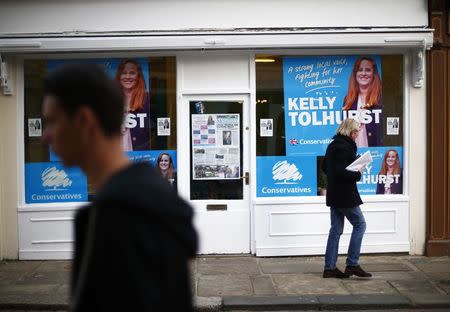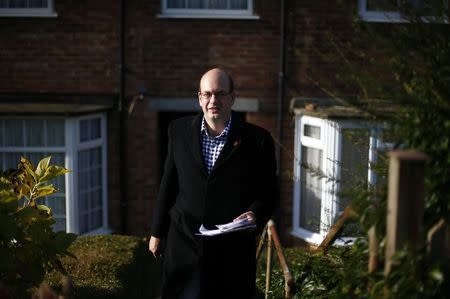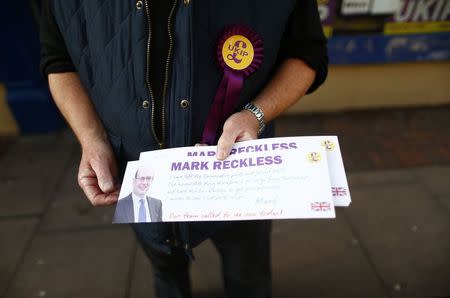Cameron on course to lose second seat to UKIP
By Andrew Osborn STROOD England (Reuters) - Standing on his doorstep beneath a red and white English national flag, brickayer Andrew Smith becomes animated when he tells the UK Independence Party candidate why he has his vote. With his wife and two small children behind him, Smith says he fervently supports UKIP's promises to curb immigration and pull Britain out of the European Union. His views aren't uncommon here in southeast England and help explain why UKIP is poised to win its second parliamentary seat on Nov. 20, taking votes from Prime Minister David Cameron's Conservatives six months before a national election. Once dismissed by Cameron as "closet racists", UKIP has poached two of his lawmakers in recent months and won its first seat in Britain's parliament in October, at his expense, after winning European elections in the United Kingdom in May. "We're an island. We can't take any more people," Smith told Mark Reckless, a former lawmaker in Cameron's party, who defected to UKIP in September, triggering the Rochester by-election. "It has to be stopped. Otherwise we're going to sink." If, as four opinion polls suggest, UKIP wins the parliamentary seat of Rochester and Strood next week, other Conservative defections may follow. With experts ranking Rochester as only the 271st most likely parliamentary seat to switch to UKIP out of Britain's 650, victory there would flag a much wider threat to Cameron's re-election chances in May 2015 than previously thought. The EU's expansion 10 years ago has enabled east Europeans to compete for jobs from sandwich-making to plumbing and professional roles. Their arrival follows decades of immigration from African and Asian countries that were once part of Britain's empire. Many Britons complain immigrants have driven wages down and housing costs up, particularly in the crowded southeast. Eastern Europeans willing to live "six or seven to a house" were pricing him and his friends out of work, said Smith, and putting an unacceptable strain on school places and the national health service. Reckless said UKIP backed a points system to allow immigrants only where there were skills shortages. Cameron's Conservatives had been over-confident about holding onto what had been a safe seat, he said. "If I do win that will be significant," he said. "People will realise we're credible." TALE OF THREE TOWNS Immigration has shot up the list of voters' concerns with UKIP blaming Britain's membership of the EU for the government's powerlessness to reduce it. Cameron's party promised to cut net migration to the tens of thousands by next year's election. But official statistics show net long-term migration into Britain has risen to 243,000 in the year to March 2014. Cameron, whose party is a whisker behind left-leaning Labour in opinion polls, is talking tough to try to stop voter desertions to UKIP, which could split the centre-right vote and gift victory to Labour in next year's national polls. The British leader told his party to mobilise all its resources to stop UKIP in Rochester. The constituency embraces Rochester's ancient cathedral and 12th century castle; Strood, popular with London commuters; and parts of Chatham, whose high street shows the scars of economic deprivation. Filled with betting shops, pawnbrokers and stores promising their goods all cost 1 pound (about $1.60), it includes units that have been boarded up after going bust. More ethnically diverse than other parts of the constituency, Chatham hosts several Halal butchers and shops which sell Afro-Caribbean and Asian foodstuffs. Sizing up a baker's window from his mobility scooter, Chris Coombs, a retired accountant, said he had always backed Cameron's party but would vote UKIP next week "to make the Conservatives sit up and take notice". He wants immigration reduced. At the other end of the street, Assad Nasseri, a former asylum seeker from Afghanistan who runs a shop selling fruit and vegetables, said he supported Labour but wouldn't be voting. "The UK needs to decide. Either you send all the immigrants home or you leave things as they are," he said. He hopes UKIP will do badly next week. "I don't like anyone who doesn't like me and I don't think UKIP likes me," he said. (Editing by Ruth Pitchford)

